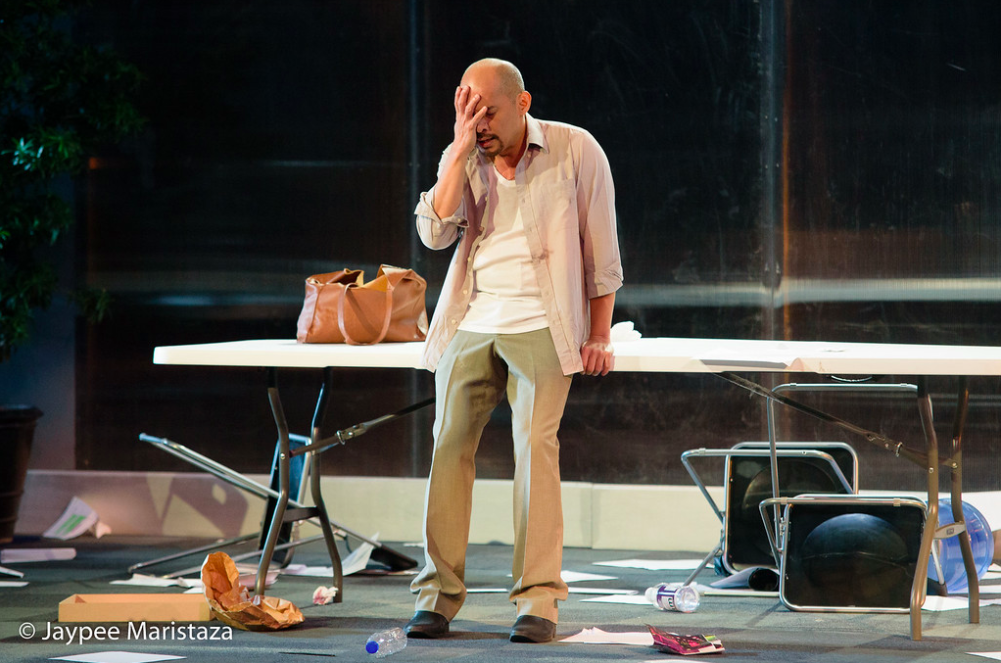
REVIEW: Murky morals in “Blackbird”
A young woman tracks down an older man, who fifteen years previously, took her into an anonymous coastal town to sleep with her. He was forty. She was twelve.
Right off the bat, we have all the words to use for this scenario: pedophilia, abuse, abduction, predator, prey—but David Harrower’s Blackbird isn’t so much about cut-and-dried definitions. In fact, his 90-minute one-act muddles morality so much, that he nearly renders it moot. What this story is, is a recollection.
Topper Fabregas directs Bart Guingona and Mikkie Bradshaw-Volante in this twisted reconnection of damaged souls.
Tension is palpable in the cluttered corporate break room after Ray (Guingona) and Una (Bradshaw-Volante) meet. Ray is tense and agitated, as though Una had no right to disrupt the new life he has successfully built for himself. Una is taunting, zeroing in on details she observes in order to mock him. Like a child. It’s almost a reversal of the predator and the prey—he’s small and cornered, she is brazen and threatening.

Photo by Jaypee Martistaza c/o The Necessary Theatre
Una’s presence renders Ray nearly inarticulate, and for good reason. “How many other twelve-year-olds have you had sex with?” Una bluntly, crudely asks. This reveal comes early, but the twists and turns don’t end there. Disturbingly enough, they get to know each other in this fresh confrontation of past trauma, and the more we learn about who they are now and what happened to them in the past, the more Harrower pulls the rug from under his audience.
Ray stumbles and skirts away from certain words and phrases as though uttering them aloud would be the nail on his coffin. He’s not what we think him so plainly to be, and this justification keeps him from being contrite. He’s not sorry—not about the abuse, at least. Because he didn’t see it as such and didn’t see himself in that way.
Una is almost more traumatized by the aftermath of her abduction. She tells Ray her experience of the night a couple had found her and brought her home. She speaks of the event as though it had been the tragic end to her personal fairytale, instead of her saving. It’s a long monologue, where the set dims to darkness with a single spotlight pointing at Bradshaw-Volante. It’s as though she slips into an internal reverie instead of outwardly revealing what she’s longed to tell him. The staging was too isolating and stationary that not even Bradshaw-Volante’s visceral emotions nor the playwright’s clear word-picture were enough to sustain one’s full attention.
It’s an unpalatable affair that often asks audiences to suspend their morals just to see this conversation through. Harrower presents a loaded, layered “what if”; what if they’re just two broken souls with an irreparable, unforgivable connection?
There needed to be a depth to their mutual damage for audiences to buy into their twisted love story. The performances were more of a dramatic back-and-forth, and lacked the profound pain that ought to have been beneath the surface. The urgency and tension that made the play compelling was largely a credit to Harrower’s writing.
Joey Mendoza’s office break room set was appropriately grubby. It’s not sterile or glossy, but lived-in almost, complete with flickering lights (lighting designer John Batalla)—the sort of place you would find a man like Ray.

Photo by Jaypee Martistaza c/o The Necessary Theatre
Though Guingona effectively was made to look like a nondescript everyman, his Ray was nearly indistinguishable from his most recent turn as Ned in The Normal Heart. While the dialogue was written in chopped up fragments, his delivery is so labored that you wonder if tumbling all over sentences was indeed by design.
Not that Ray evokes or deserves sympathy, but he always tries to make sense of what he did, explaining that he was not driven by an ill impulse, but out of an unfortunately sincere feeling of romantic emotion. Believing Guingona’s performance was paramount to buying Ray’s justifications, but there was a disconnect there. His words felt like excuses that you don’t quite trust. This informs the show’s final 20 minutes; when it’s revealed that—spoiler alert—he’s the caretaker of another young girl, it ought to have posed more questions instead of giving an unequivocal confirmation: yes, Ray is a pedophile.

